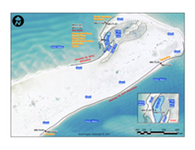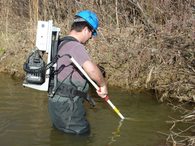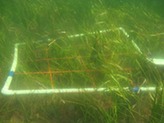Dr. Barry A. Vittor was appointed an Assistant Professor of Marine Science in the University of Alabama Marine Science Program in 1971. He was based at Bayou La Batre until 1972, when he assisted in development of the Dauphin Island Sea Lab. Dr. Vittor was promoted to Associate Professor in 1976, then left the University in 1977 and founded Barry A. Vittor & Associates, Inc.
While with the University of Alabama, Dr. Vittor’s principal areas of research involved benthic ecology and coastal wetlands. He conducted extensive studies of the effects of channel dredging on estuarine benthos, water quality, and sediments, as well as the potential beneficial uses of dredged material for coastal marsh creation. He also became recognized as an expert in the taxonomy of benthic polychaetous annelids, which comprise a critical component of estuarine and marine bottom-dwelling biota.
Since the inception of Vittor & Associates, Dr. Vittor
has been heavily involved in studying the toxicity of sediments and effluents
to a wide variety of aquatic and marine organisms. His work has focused
primarily on bioassay, bioaccumulation, and risk assessment of dredged material
in inland and coastal waters. He has also managed numerous investigations of
benthic communities at ocean dredged material disposal sites for the US
Environmental Protection Agency and U. S. Army Corps of Engineers.
Dr. Vittor has worked for years with wetlands restoration and management
projects and has assisted in regulatory agency permitting of hundreds of public
and private developments throughout the Southeast.
As a past-Director of the Alabama Coastal Foundation, and a member of the Mobile
Bay National Estuary Program Management committee, Dr. Vittor has been very
active in assessing and planning coastal resource management. As President and
Senior Scientist at Vittor & Associates, Dr. Vittor has responsibility for
planning and coordination of a wide range of environmental programs, including
wetlands assessments, ecological restoration, toxicity studies, water quality
monitoring, resource characterization and management and long-range planning
for dredged material disposal.
Dr. Carl M. Way began his professional career as an
Assistant Professor of Biology and Instructor of Computer Science at
Alderson-Broaddus College in 1983. In 1986, Dr. Way moved to Northwestern
University in Evanston, Illinois as an Assistant Professor in the Dept. of
Ecology and Evolutionary Biology.
Dr. Way worked as an Aquatic Ecologist at the
Waterways Experiment Station of the U.S. Corps of Engineers from 1988 to 1994.
Dr. Way worked primarily on the ecology of benthic organisms in large riverine
ecosystems, the effects of commercial navigation traffic on riverine
invertebrates, and threatened/endangered species monitoring and recovery plans.
In 1990, Dr. Way became a Senior Scientist and Leader of the Aquatic Simulation
Team at the Waterways Experiment Station. Dr. Way was responsible for studies
in hydraulic stream ecology, instream flow management, dynamic simulation
modeling of threatened/endangered species for the evaluation of management
plans, stream habitat restoration, and the development of techniques for
determining the microhabitat hydrologic requirements of small stream organisms.
Additionally, Dr. Way was responsible for managing Team personnel, budgets,
project milestones and project deliverables within the Federal Contracting
system.
Dr. Way joined Barry A. Vittor & Associates, Inc. in 1994 as a Senior
Program Manager and Senior Scientist. He was responsible for projects dealing
with coastal, nearshore and offshore biological monitoring studies, offshore
dredged material disposal site (ODMDS) monitoring studies, pipeline monitoring
studies, threatened/endangered species surveys, flood control projects, sewage
treatment discharge monitoring studies, and habitat restoration studies. As
Senior Vice President, Dr. Way is currently responsible for analytical
methodologies, technical analyses, and deliverables at Vittor & Associates.
Dr. Way is also Project Manager and Senior Scientist for a variety of Federal, State and private
environmental services contracts.
Tim D. Thibaut began his professional career in 1986 as a creel surveyor for the Auburn University Fisheries Department. After beginning graduate training in 1988, Mr. Thibaut was employed as a graduate teaching assistant (1988 to 1991) in the Auburn Biology Department and also as a research assistant at the Dauphin Island Sea Laboratory (1988 to 1993). As a research assistant, Mr. Thibaut participated in varied and numerous scientific projects, including wetland creation and restoration, monitoring of vegetated aquatic habitats, and experiments of macroinvertebrate behavior, including habitat selection by decapod crustaceans, blue crab prey location, and induction of oyster larvae settlement. Mr. Thibaut has been a post-secondary educator since 1994, serving as adjunct biology faculty at Faulkner State Community College in Fairhope, Alabama.
Mr. Thibaut joined BVA in 1993 as a Staff Biologist and was made a Senior Program Manager in 2002. During his tenure at Vittor & Associates, Mr. Thibaut managed the NEPA process on behalf of public and private sector clients, including production of environmental impact statements and environmental assessments. He has reviewed and reported on impacts resulting from sand mining, dredged material disposal, offshore and onshore pipeline construction, and other regulated activities. Mr. Thibaut has compiled and analyzed benthic biological information for several technical studies for the Minerals Management Service along the Atlantic and the Gulf Coasts, addressing potential effects of sand mining in Federal OCS waters. He has provided environmental consultation for the U.S. Coast Guard since 2005, assisting with environmental compliance during derelict vessel and debris removal in coastal Mississippi, in the aftermath of Hurricane Katrina. Mr. Thibaut is an experienced benthic taxonomist, functioning primarily as a verification specialist of identified polychaetous annelids.


